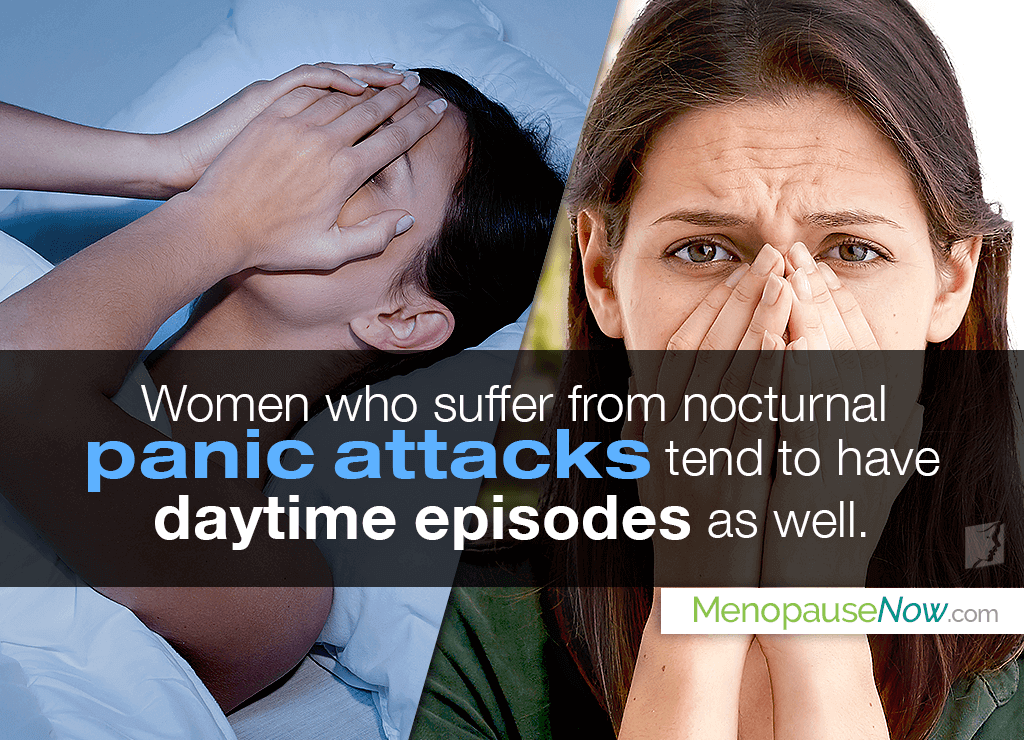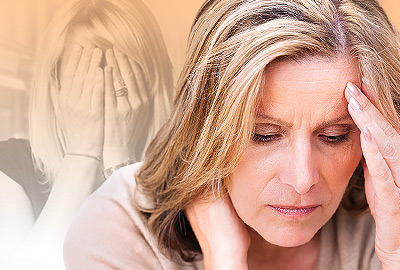Just as women can suffer from daytime panic attacks, nocturnal panic attacks can also strike, for many of the same reasons as their earlier counterparts. Continue reading to learn all about nocturnal panic attacks, including causes, symptoms, management, treatment, and much more.
Causes of Nocturnal Panic Attacks
One of the most frustrating aspects of nocturnal panic attacks are that they often occur with no obvious trigger or cause, similar to panic attacks during the day.
Identified factors that may play a role in their occurrence include stress, genetics, and changes in the way the brain works.
Menopausal women may also be no stranger to panic attacks as drastic hormonal fluctuations as well as other menopause symptoms, like anxiety or depression, may trigger their appearance.
What is also acknowledged is the apparent connection between daytime and nocturnal panic attacks as those who suffer from them while sleeping tend to have them when they're awake.
Nocturnal Panic Attack Symptoms
Some of the most common symptoms of sleep panic attacks mirror those of daytime panic attacks. They include:
- Flushed skin
- Chills
- Sweating
- Shortness of breath
- Trembling
- Hyperventilation
- Rapid or irregular heartbeat
- Sense of impending doom
As a woman is having a panic attack, it is important she remember that although alarming, it is not dangerous nor life-threatening.
Nevertheless, she should also keep in mind that some nocturnal panic attack symptoms may be the same as those of another underlying medical condition, such as a heart attack, thyroid disorder, or sleep disorder. As such, it is essential for her to verify the symptoms' real cause.
Management Techniques
Women suffering from nocturnal panic attacks likely search for recommendations that will provide them instant relief and allow them to fall back asleep. These suggestions include:
Keeping a glass of water nearby. For those who break out in a sweat with flushed skin during their nocturnal panic attack, sipping on cool water may help bring one's internal temperature down.
Stepping outside. When in the midst of an attack, women can try to move outside of their warm bedroom for a breath of fresh air, either into a different room in the house or outside.
Taking some deep breaths. No matter the time of day, deep breathing exercises are found effective in easing symptoms. Breathe in, hold, and then breathe out deeply and slowly, for up to a count of five seconds with each. Keep eyes closed while focusing on the movement of air.
Using lavender oil. Standardized lavender oil extract has been scientifically studied to have an effect in treating anxiety disorders, including restlessness and agitation with disturbed sleep.1 Try adding a couple drops to an essential oil diffuser as you drift back to sleep.
Nonetheless, long-term alleviation and a calm state of mind will only be achieved once the underlying cause is identified and treated.
Nocturnal Panic Attacks Treatment
As aforementioned, long-lasting relief from panic attacks - no matter the time of day they occur - will only be possible once what is causing them is treated.
For menopausal women, this is most likely hormonal imbalance. As such, focusing on a plan that optimizes endocrine system health through lifestyle changes along with alternative medicine will reap enduring results. Natural and effective treatments for panic disorder and panic attacks do just that.
Furthermore, by pursuing initiatives that support the well-functioning of the body as a whole, other menopause symptoms will also be lessened, such as hot flashes, night sweats, mood swings, and more.
In the case that these wholesome approaches do not pay off, women may be recommended nocturnal panic attacks medications, which may include antidepressants or sedatives, or psychotherapy.
All in all, speak with your doctor concerning the best line of action for your hormonal health based on your medical history and preferences.
Conclusions
Women must not throw in the towel and give up when it comes to conquering their nocturnal panic attacks and other harrying symptoms of menopause. With the right information alongside a little initiative to improve one's current quality of life, relief is not far from reach.
Sources
- Cleveland Clinic. (2016). Can Menopause Cause Your Anxiety or Panic Attacks? Retrieved November 5, 2019, from https://health.clevelandclinic.org/can-menopause-cause-your-anxiety-or-panic-attacks/
- Mayo Clinic. (2018). Nocturnal panic attacks: What causes them? | Panic attacks and panic disorder: Diagnosis & treatment. Retrieved November 5, 2019, from https://www.mayoclinic.org/diseases-conditions/panic-attacks/expert-answers/panic-attacks/faq-20057984 | https://www.mayoclinic.org/diseases-conditions/panic-attacks/diagnosis-treatment/drc-20376027
- NHS. (2018). How to deal with panic attacks. Retrieved November 5, 2019, from https://www.nhs.uk/conditions/stress-anxiety-depression/coping-with-panic-attacks/
Footnotes:
- Malcolm, B.J. et al. (2017). Essential oil of lavender in anxiety disorders: Ready for prime time? The Mental Health Clinician, 7(4), 147-155. doi: 10.9740/mhc.2017.07.147




